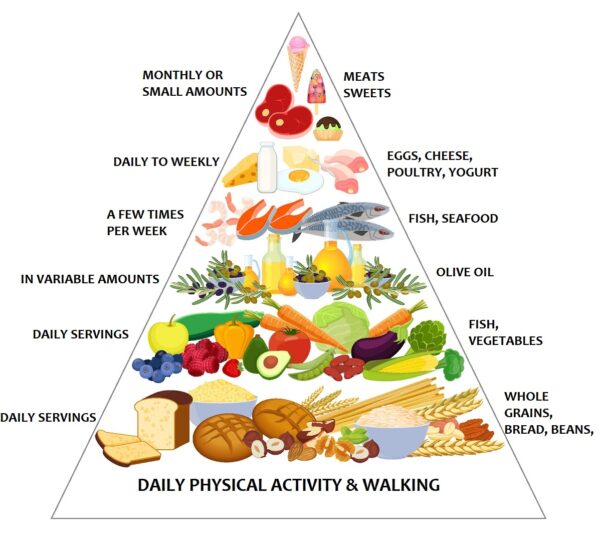Health Benefits of The Mediterranean Diet During Menopause
The Mediterranean Diet, celebrated as one of the healthiest diets globally, draws inspiration from the culinary traditions of Greece, Spain, and Italy. More than a dietary plan, it embodies a way of life that champions wholesome eating, physical activity, and social connection. Consisting of heart-healthy foods, the nourishing benefits of the Mediterranean Diet can deliver potential benefits for women navigating menopause, particularly for brain health.
Nutrient-Dense Benefits of The Mediterranean Diet
Rooted in a foundation of fruits, vegetables, whole grains, legumes, olive oil, and lean proteins, this diet is marked by its minimal consumption of red meat, refined sugar, and saturated fats. This mosaic of plant-based foods forms the diet’s cornerstone, supported by moderate portions of fish and poultry, while red meat finds a limited presence. Among these elements, monounsaturated fats are a star performer in olive oil.
Adopting this eating pattern is relatively easy: stocking the pantry and refrigerator with common foods we find in the grocery store.

Benefits of the Mediterranean Diet During Menopause
The Mediterranean Diet consists of foods that deliver broad-range benefits, including the potential to balance hormones naturally. Phytoestrogens in foods like soy, flaxseeds, and whole grains subtly elevate estrogen levels, relieving menopausal discomfort. The diet’s inclusion of healthy fats from olive oil and fatty fish fosters hormone synthesis, while its emphasis on balanced, consistent meals aids in regulating blood sugar levels—a pivotal factor in hormone equilibrium. Additional health benefits include:
Cognitive Health: The drop in estrogen during menopause can lead to cognitive decline, also known as “brain fog.” The diet’s healthy fats and antioxidants boost brain health, aided by low-processed foods and rich vitamin B sources. B vitamins synthesize mood-regulating neurotransmitters like serotonin, dopamine, and GABA, which regulate mood, behavior, and cognitive processes.
Heart Health: Menopause increases the risk of cholesterol and heart disease, but the diet’s heart-friendly components provide essential nutrients that promote heart health.
Weight Management: As metabolism slows, weight gain becomes a concern for many women going through menopause. With an emphasis on healthy fats and the elimination of refined sugar, the diet can play a role in helping women manage their weight.
Bone Health: Menopause elevates the risk of bone loss and osteoporosis. Foods dense in calcium and vitamin D play a delicious role in protecting bone density.
Reduced Inflammation: Omega-3 and 6 fatty acids provide anti-inflammatory benefits. It promotes a healthier balance of beneficial bacteria for gut microbiome, associated with reduced inflammation and improved immune health.
The Mediterranean Diet and Brain Health
Hormonal shifts during menopause can impact brain health, leading to mood swings, depression, and cognitive decline. Brain-boosting omega-3 fatty acids nurtures neuron health, enabling seamless communication between brain cells while decreasing inflammation that can cause brain fog. The Mediterranean Diet nourishes the brain with a powerful combination of antioxidants, shielding it from oxidative stress—responsible for aging and cognitive decline. The diet’s protective antioxidants, vitamins C and E, and flavonoids, are found in fruits, vegetables, olive oil, and even the occasional indulgence of red wine.
Enhancing the Mediterranean Diet During Menopause
In addition to following the food guide for the Mediterranean Diet, PearlPAK™ emerges as another resource for women going through perimenopause and menopause. A clinically validated prescription treatment designed to prevent cognitive decline during menopause, PearlPAK™ relieves hot flashes, night sweats, and mood swings. Taking PearlPAK and eating according to the Mediterranean Diet creates a powerful toolbox for women to proactively address menopause health.
Is PearlPAK right for you? Contact us today or take our free online questionnaire to be connected with one of our HIPPA-compliant, board-certified physicians.
PUBLISHED ON:
August 19, 2023